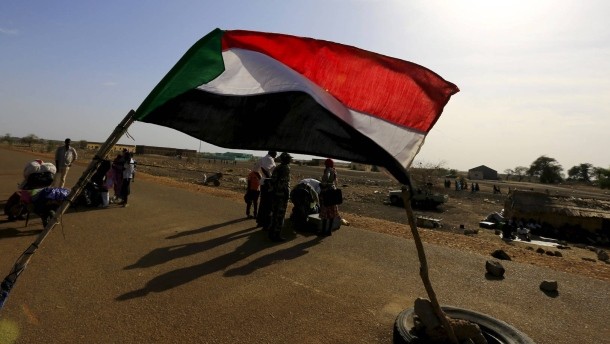The impact of regional and international changes on US foreign policy towards the Middle East

Prepared by the researcher : Entisar Saber Mohammed – Master’s researcher at the Research Institute of the League of Arab States – Egypt
Democratic Arab Center
The Middle East region will remain a vital strategic area for US national security, as the new US administration, with the arrival of “Joe Biden”, began to reconsider its foreign policy, which is based on a pattern of principles that highlight several dimensions with idealistic and value orientations, and to strengthen its relations with its strategic allies and raise the level of The American commitment is mainly to prove its effective role, to adapt to the changes in the regional and international environment, and to focus on effective mechanisms to overcome shortcomings in the face of the transformations brought about by the practices of regional and international powers in the region.
The US administration has realized the depth of political transformations and the challenges facing US national interests in the Middle East region, especially with the multiplicity of crises and turmoil in addition to changes in the regional balance of power in light of the emergence of regional and international actors seeking to compete with the US geopolitically in the region. The most important of which is related to the ongoing transformations in Libya and the eastern Mediterranean, and the resumption of Arab-Gulf relations following the signing of the four Arab coalition countries, Saudi Arabia, the UAE and Bahrain, in addition to Egypt.
The Interim Strategic Guide document pledged to protect Israel’s security and seek to strengthen its relations with its neighbors, and to resume America’s role as a supporter of the two-state solution. And that Washington will work with its allies in the region to deter the Iranian nuclear aggression and threat, and Iran’s threats to the sovereignty and territorial integrity of states, and to eliminate Al Qaeda and its associated terrorist networks, and prevent the resurgence of ISIS, but it stated in return that the US administration will not give its partners in the Middle East an open check to exercise Policies that contradict American interests and values.
The US administration has sought to achieve a number of basic goals, which are linked to its strategic interests in the world and the region, against the background of the threats produced by the Russian intervention in Ukraine and the expansion of Moscow and Beijing in the Middle East. Among the most important of these interests is the security of Tel Aviv, which is one of the most important strategic interests of the United States, because Israel is not only a Middle Eastern country in the American strategy, but rather an American state outside the borders of the United States and an advanced spearhead in this strategy, as well as the energy supplies that It is one of the most important goals that the Biden administration sought, as it aimed to increase the production of oil in the Gulf countries and Iraq to counter the rise in global prices, and the repercussions of this on energy prices in European countries and at home in the United States due to the sanctions imposed on the Russian energy sector after Moscow’s intervention in Ukraine. Especially with the emergence of some tendencies to head east towards Russia and China, which the US administration has confirmed its rejection decisively and clearly, and that it will not leave the region to expand Moscow or Beijing, and there will be new members in the cooperation between the countries of the region, including Israel. The Jerusalem Declaration stipulated that the United States affirmed its firm commitment to preserving and strengthening Israel’s ability to deter its enemies, in line with the long-term security relationship between the two countries, the firm American commitment to Tel Aviv’s security, and the preservation of its qualitative military superiority and its ability to defend itself against any threat or group. Threats, and Washington reaffirms that these commitments are supported by both parties, and are not just moral obligations, but also strategic commitments of vital importance to US national security. From the aforementioned, it can be said that the new directions of US foreign policy towards the Middle East region reflect the features of a new phase in interactions. Regional in light of the political transformations that the region is going through, especially since the regional environment in the Middle East region is witnessing competition and conflict of wills related to goals, and we conclude from this definition a collision of interests between the influential actors, whether regional or international, which is reduced to many perceptions towards areas of influence and the vital base in the region, Which necessitates a change in the American vision based on an extrapolation of reality, and accordingly the American administration is based on adopting the diplomatic tool to deal with regional issues and redoubling efforts in correcting the imbalances in the balance of power in the region, by trying to address strategic issues that lie in the axes of political importance, This is reflected in the vision of the possible redistribution of its military forces in the world, including the Middle East region.
The future of US-Arab relations
Despite the existing regional and international developments, the United States, as the ally or strategic partner of most countries in the Middle East, the main change that occurred in the determinants of its foreign policies is the victory of the Republican Party in the majority of seats in the House of Representatives and the extent to which this may affect the directions of American policy towards the countries of the region, and that By virtue of the Council’s role in approving any spending in the field of foreign policy.
It is likely that the US administration will move towards the Middle East on four paths, as follows:
The first track: It is related to its traditional allies, whose stances towards the war in Ukraine varied, and most of them did not show a position of full support for American policy. The Arab oil-producing countries are in the “OPEC Plus” group, which sometimes necessitated public criticism from Washington towards them. Washington is expected to continue developing its relations with key Arab countries, such as Egypt, Saudi Arabia and the UAE, which have improved at the end of 2022, and which will be supported by the new Republican majority. This means developing relations in a positive way and accepting a space of independence for the positions of these countries.
This confirms Washington’s lack of criticism of Chinese President Xi Jinping’s visit to Saudi Arabia, from December 7 to 9, 2022, and his meeting with leaders of the Gulf Cooperation Council and the Arab League, and the comment of the White House National Security Council spokesman, John Kirby, that the United States understands That every country moves according to its interests and that Washington did not force its friends to choose between it and Beijing. It is a tone that differs from what President Biden announced in his speech before the Jeddah summit, that there is no vacuum in the region, and that the United States will not allow Russia and China to expand their influence in it.
The American interest in a number of Arab countries will continue, such as Algeria, which was keen to win its favor in 2022, although it is a traditional partner of Russia with which they have strategic economic and military relations. However, Washington and European countries such as France and Italy view Algeria as a friendly country and seek to buy gas from it. This is evidenced by the fact that when the Russian President, Putin, praised her during his reception of the new Algerian ambassador on September 20, 2022, Washington did not leave this statement without comment. On the same day, the US State Department official in charge of North Africa and the Middle East, Barbara Lev, stated, That Algeria is a strong partner for the United States for peace and stability in the region and the African continent.
It is likely that Washington will continue to follow this policy despite its concern about Algeria’s growing relations with Iran, and its stance towards the Polisario Front. Washington will also continue to improve its relations with Tunisia, Morocco and Mauritania, especially in light of the development of Rabat’s relations with Israel, and Mauritania’s role in the war against terrorism in West Africa, which explains its invitation to attend the NATO summit in Madrid in May 2022.
In the same context, it is expected that the United States will continue to pursue active diplomacy in Lebanon to implement the agreement to demarcate its maritime borders with Israel, which was mediated by the United States, and to persuade the Lebanese parties to agree on the new president. Washington will also continue to communicate with civil and military parties in Sudan to implement the transitional agreement reached in December 2022, and support the Iraqi government against Iranian and Turkish military attacks on Iraqi Kurdistan.
The second track: is to deter Iran to prevent it from taking any military action against the interests of the United States and its allies in the region, especially after the failure of the Vienna talks to re-establish the nuclear agreement, and Tehran’s announcement of testing hypersonic ballistic missiles. This deterrence took several forms, including the entry of the nuclear submarine “USS West Virginia” into the Arabian Sea last October, the “B-52” strategic bombers’ sortie last November, and the statement of the US envoy to Iran, Robert Malley, on the first of December 2022, That President Biden is ready to use the military option to prevent Iran from acquiring nuclear weapons, and the US Department of Defense “Pentagon” warns the Iranian Revolutionary Guard against the approach of its gunboats to US ships in the Gulf and the Arabian Sea. And it will support the American deterrence policy towards Iran, the position of Israel, which will be ruled in 2023 by an extreme right-wing government; It is likely to raise the tone of its threats to use armed force against Tehran.
On the political side, it is expected that the United States and Western countries will continue to exploit the popular demonstrations that have taken place in many Iranian cities since last September, and highlight them in the media as evidence of the instability of the ruling regime in Tehran, the deterioration of its legitimacy, and its use of excessive force to maintain its existence. Washington will support the continuation and expansion of these demonstrations, in the hope that this will lead to the Iranian regime becoming more fragile and weak.
The third track: It is the relationship between tension and improvement with Turkey, which indicates the possibility of more tension in Washington’s relations with it in light of the Turkish threat at the end of 2022 to launch a ground campaign against the Kurdish areas in northern Turkey. On the pretext of purifying it from the elements of the Kurdistan Workers Party. Washington considers the Kurds, represented by the Syrian Democratic Forces (SDF), a strategic ally that has proven its worth in the war against ISIS. In the face of the Turkish threat, the US Department of Defense announced its opposition to such a threat.
The renewal of tension between Washington and Ankara came after a period of rapprochement, which was represented by Congress’s decision to cancel the restrictions imposed on the sale of “F-16” aircraft to Turkey last October, and in the visit of a delegation from the US Department of State and Finance to Ankara in the same month to discuss the files in dispute between the two countries. US relations with Turkey will remain a concern due to the latter’s policies towards the Kurds and towards Greece and Cyprus in the eastern Mediterranean.
The fourth track: related to Israel, as there is a possibility that a dispute will emerge between the US administration and the new right-wing government in Tel Aviv. Because of the measures that the latter can take towards the Palestinians in the occupied territories, the increase in settlement activity, and the creation of obstacles to the implementation of the maritime border demarcation agreement with Lebanon. However, this dispute will remain of a media nature, and will not affect the close relations between the two countries, and will be supported by the Republican majority in the US House of Representatives.
Conclusion:
Undoubtedly, there is a development at the political level in the Middle East region, which is reflected in the geopolitical shifts in the regional environment. Its foreign political behavior in light of the Joe Biden administration’s “temporary evidence” strategy, and the most important possibilities of transforming this policy in the region, which in turn is a vital geographical area for America to serve its security, economic and political interests and goals. The study reached practical results that included the US administration’s pursuit of a number of basic goals that are linked to its strategic interests in the world and the region, against the background of the Russian intervention in Ukraine and the expansion of Moscow and Beijing in the Middle East.
In this context, the most important interests pursued by the US strategy are the security of Tel Aviv, because Israel is not only a functional state in the US strategy, but rather an American state outside the borders of the United States. In addition, Israel’s security represents one of the goals of the round. Biden in the Middle East. Likewise, the Joe Biden administration’s interest in energy supplies is one of the most important goals of Joe Biden’s visit, as it aimed to increase oil production in the Gulf states and Iraq to counter rising prices globally. And against the background of the sanctions imposed by the United States on the Russian energy sector after Russia’s invasion of Ukraine, Biden’s visit partially succeeded in achieving this goal after Saudi Arabia announced an increase in production to 13 million barrels per day, but Riyadh’s declaration of its inability to increase more than that led to a limitation of production. Achieving the result that Biden’s strategy was seeking. Accordingly, US President Joe Biden’s visit to the Middle East succeeded in strengthening the US presence in the region based on the convening that took place at the Jeddah Summit for Security and Development, which included a number of participating countries, especially with the emergence of some differences over heading east towards Russia and China, which was confirmed by the administration. America decisively and clearly, and it will not leave the region to expand Moscow or Beijing. Washington stresses that the goals and commitments of the strategy are of vital importance to US national security.




